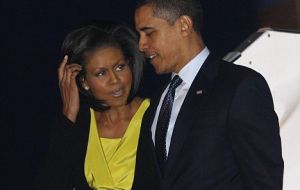MercoPress. South Atlantic News Agency
Obama in London to convince G-20 he can lead the world out of recession
 Pte. Obama and his wife Michellearrive at Stansted Airport
Pte. Obama and his wife Michellearrive at Stansted Airport United States President Barack Obama is in the United Kingdom for his first major foreign trip since taking office in January. In London he is to attend the G20 summit of the world’s 20 major economies representing 85% of global GDP, which is hosted by British Prime Minister Gordon Brown. The two will have breakfast talks in Downing Street on Wednesday followed by meetings with other world leaders.
The summit comes as two international organisations predicted the worst global economic downturn since the Second World War. The World Bank said the global economy will shrink by 1.7% this year while the Organisation for Economic Co-operation and Development put the expected contraction at 2.7%.
President Obama was met at Stansted Airport, north of London, by UK Chancellor of the Exchequer Alistair Darling and a senior official from the US Embassy.
He then boarded the presidential helicopter Marine One to make the short journey to central London where he is staying at the US ambassador's residence.
Before the start of the G20 summit of world leaders on Thursday, Mr Obama will hold extensive talks with Gordon Brown; meet the UK opposition leader David Cameron and have a private audience with the Queen.
The president is also scheduled to hold bi-lateral meetings with Russian President Dmitry Medvedev, Chinese President Hu Jintao, Indian Prime Minister Manmohan Singh, South Korean President Lee Myung-bak and King Abdullah of Saudi Arabia.
The president's wife, Michelle Obama, will take part in a series of engagements with Sarah Brown, the prime minister's wife.
Mr Brown is keen for world leaders to reach agreement on a new set of rules for regulating global finance as well as measures to boost economic demand and support poorer countries.
According to UK officials, the prime minister spoke to the president on the phone during his flight to “identify outstanding remaining issues” ahead of the gathering of world leaders. The call was an “opportunity for both of them to take stock of where we were,” a No 10 spokesman said.
According to the BBC, President Obama will assert that the US has changed, that America is willing to listen and engage, but he will also insist that the US still has the capacity to pull the world in the right direction.
A White House spokesman stressed the president would “listen in London as well as lead”.
However President Obama hopes for a co-ordinated “fiscal stimulus” of tax cuts and state spending to boost global demand looks set to run into the sand of European opposition and resistance from central bankers, including the Bank of England's Mervyn King.
Speaking earlier at a gathering of religious leaders at St Paul's Cathedral, Mr Brown called for the “values that we celebrate in everyday life” to be brought to the financial markets.
Mr Brown has set out five “tests” which the G20 must meet: providing resources for the IMF and World Bank to support struggling economies; cleaning up the banking system; doing “whatever is necessary” to restore growth; resisting protectionism; and delivering low-carbon growth.
But with few hours before the London summit, further splits are emerging on how to tackle the economic crisis.
The French Finance Minister, Christine Lagarde, told the BBC that France would walk away from any agreement if the US and the UK were not prepared to accept a stronger financial regulator.
French President Nicolas Sarkozy and German Chancellor Angela Merkel are planning a joint press conference on Wednesday, fuelling speculation of a united front against UK and US calls for a further co-ordinated fiscal stimulus.
But German finance minister Peer Steinbruck told the BBC's Newsnight program that it was unlikely anyone would walk out of the meeting and it was “highly probable” that an agreement would be reach on enhanced financial regulation.
G20 countries have been divided over the size of their respective packages to boost economic demand and what further action may be needed.
Some European leaders have argued that the economic crisis began in the US, and that America's stimulus package should therefore be more robust than other nations.
“This crisis started in the United States,” said Luxembourg's Prime Minister Jean-Claude Juncker last week.
“The Anglo-Saxon world has always refused to add the dose of regulation which financial markets, the international financial system needed,” he added.
There are signs of agreement on other issues, however.
German Chancellor Angela Merkel is reported to have said that chances were high that deals - for example, to regulate hedge funds - would be reached.
On Friday, Mr Obama will travel to Strasbourg, France, where he will hold talks with French President Nicholas Sarkozy, and stage a “town hall” style meeting, before heading over the border to Baden-Baden in Germany for a meeting with Ms Merkel.
He will also attend the NATO summit on Saturday in Strasbourg, where talks are expected to focus on the ongoing military operations in Afghanistan.
Mr Obama will then head off to the Czech Republic to attend the EU-US summit, before travelling on to the Turkish capital, Ankara.
It will be Mr Obama's first trip to an Islamic country since he entered the White House.




Top Comments
Disclaimer & comment rulesCommenting for this story is now closed.
If you have a Facebook account, become a fan and comment on our Facebook Page!